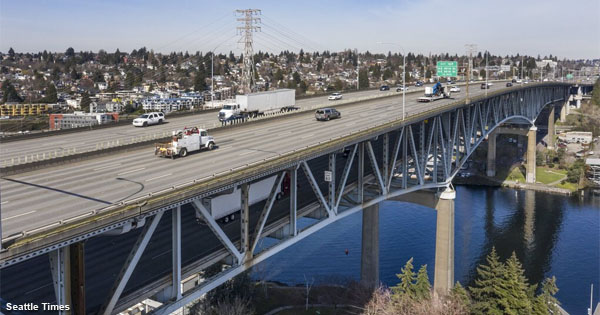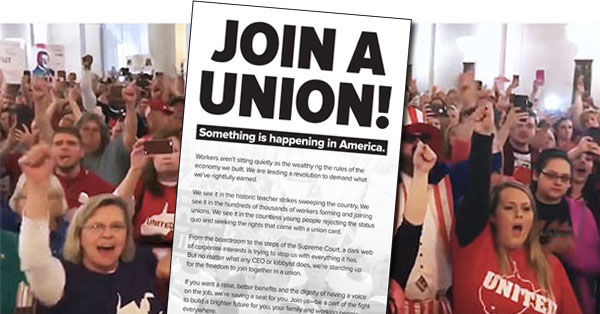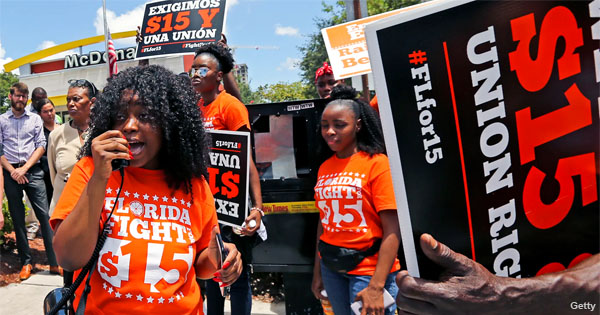NEWS ROUNDUP
Our glide path to transportation failure | An NLRB that works | Join a union!
Wednesday, April 7, 2021
COVID-19
► LIVE from the Seattle Times — Coronavirus daily news update, April 7 — The latest count of COVID-19 cases in Washington totals 370,652 infections (7-day average of new infections per day: 1,010) and 5,299 deaths.
 ► From the Seattle Times — COVID herd immunity? Parts of Washington state appear in no mood to join this herd — The 10 counties with the lowest vaccination rates have all seen 22% or fewer of their residents get the first shot so far — with nine of those 10 being red counties east of the Cascades… Why does this matter? Because public health officials say to reach herd immunity, to the point that life could return to a semblance of normal, 70% to 80% of state residents need to be immune. Unless you live in Jefferson County (more than 50% vaccinated) or the San Juan Islands (47% have gotten at least one shot), we are a looong way from reaching the herd goal… Says one COVID-19 data scientist, “The No. 1 correlating factor for whether you’ll get the vaccine is whether you voted for Trump.” Trump did get vaccinated himself in January, but a majority of GOP voters told pollsters they hadn’t heard about that (nearly twice as many had heard the news about the Dr. Seuss books being pulled).
► From the Seattle Times — COVID herd immunity? Parts of Washington state appear in no mood to join this herd — The 10 counties with the lowest vaccination rates have all seen 22% or fewer of their residents get the first shot so far — with nine of those 10 being red counties east of the Cascades… Why does this matter? Because public health officials say to reach herd immunity, to the point that life could return to a semblance of normal, 70% to 80% of state residents need to be immune. Unless you live in Jefferson County (more than 50% vaccinated) or the San Juan Islands (47% have gotten at least one shot), we are a looong way from reaching the herd goal… Says one COVID-19 data scientist, “The No. 1 correlating factor for whether you’ll get the vaccine is whether you voted for Trump.” Trump did get vaccinated himself in January, but a majority of GOP voters told pollsters they hadn’t heard about that (nearly twice as many had heard the news about the Dr. Seuss books being pulled).
► From The Hill — Five states account for nearly 44 percent of new U.S. COVID-19 cases — Nearly 197,500 cases can be traced back to New York, Michigan, Florida, Pennsylvania and New Jersey. That’s 43.6 percent of all cases.These five states account for just 22 percent of the U.S. population.
THIS WASHINGTON
► From the Seattle Times — Delayed repairs threaten Washington state bridges and highways. Will lawmakers act this year? — The state would need to spend an estimated $14.8 billion over the coming decade, or nearly $2,000 per resident, to achieve “minimally acceptable condition,” meaning roads, ferries and bridges could be maintained faster than they crumble. That’s twice the current spending on preservation, which WSDOT defines as planned repairs that extend the life of an asset, as opposed to stopgap jobs like pothole filling. “We are on a glide path to failure under current funding,” state Transportation Secretary Roger Millar said in early March. Will this be the year leaders stop procrastinating?
► From the Columbian — Capital budget exemplifies investment in state (editorial) — The biennial capital budget for construction projects does not receive the attention of the two-year operating budget, but wise spending on construction will be essential for helping Washington recover from the pandemic. Capital projects not only provide the infrastructure for a prosperous future, they put people to work in constructing that future.
► From the News Tribune — State Senate passes bill that bans chokeholds, sets standards for police tactics — The state Senate approved a bill Tuesday that would set standards for police tactics and equipment statewide, in part banning chokeholds, neck restraints, and no-knock warrants. The Senate amended the bill, so it will now go back to the House of Representatives so it can consider the amendments. HB 1054 would set limitations on military equipment, use of tear gas, and vehicular pursuits. It’s one of the major pieces of legislation up for consideration this session with roots in last year’s resounding calls for racial justice and police reform.
EDITOR’S NOTE — The WSLC supported passage of HB 1054.
► From the Seattle Times — Social equity in cannabis industry at stake in legislative bills, licensing — Nine years ago, Washington state broke major ground as one of the first two states to legalize the recreational use of marijuana. But left out of the conversation in 2012 was something that’s slowly gaining attention — racial equity in the cannabis industry.
► From Marijuana Moment — Washington lawmakers hear drug decriminalization bill after Supreme Court strikes down prohibition — Many drug reform advocates were broadly supportive of SB 5476 but said it needed to provide more support to people in need, such as by investing in expanded drug treatment outreach and recovery services. “The war on drugs has particularly hurt Black, brown and Indigenous communities,” said Sybill Hyppolite, legislative director for the Washington State Labor Council. “This bill provides a minimum statewide standard of protection from this punishment. This is an important step, and also we know more is needed to undo the war on drugs, to build a true system of care.”
BOEING
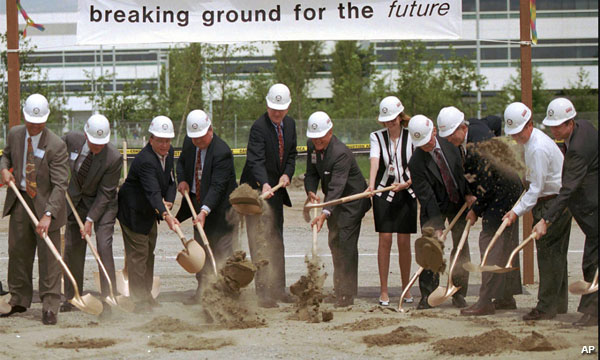
Boeing’s then-President Ron Woodard (fifth from left) breaks ground with Boeing officials to make way for the Boeing Commercial Airplane Group Headquarters Office Building at the Longacres Park site in Renton on May 14, 1997.
► From the Seattle Times — Boeing puts up for sale its Commercial Airplanes headquarters campus outside Seattle — Nearly six months after Boeing first acknowledged it might sell its local Commercial Airplanes headquarters building in Renton, it officially listed the Longacres campus for sale Tuesday — a move sure to intensify doubts about the aerospace giant’s long-term corporate presence in Washington state.
► From the PS Business Journal — Boeing 737 MAX supplier files for bankruptcy, seeks sale of Everett plant — Boeing 737 Max supplier TECT Aerospace Group said Tuesday it has filed for protection from its creditors in a Chapter 11 bankruptcy proceeding in U.S. District Court for Delaware, revealing its Everett factory is up for sale.
LOCAL
 ► From RUSA Update — Labor Archives of Washington, WU Libraries Special Collections, wins John Sessions Memorial Award — The American Library Association’s Reference & User Services Association presented the 2021 John Sessions Memorial Award to the Labor Archives of Washington for its proactive efforts to reflect a more representative working-class history of the Pacific Northwest through its practices to address representation gaps in occupational communities, racial and ethnic groups, women, LGBTQ+ workers, and other historically marginalized communities, and for its collaborative oral history project documenting workers in the COVID-19 pandemic.
► From RUSA Update — Labor Archives of Washington, WU Libraries Special Collections, wins John Sessions Memorial Award — The American Library Association’s Reference & User Services Association presented the 2021 John Sessions Memorial Award to the Labor Archives of Washington for its proactive efforts to reflect a more representative working-class history of the Pacific Northwest through its practices to address representation gaps in occupational communities, racial and ethnic groups, women, LGBTQ+ workers, and other historically marginalized communities, and for its collaborative oral history project documenting workers in the COVID-19 pandemic.
► From the Oregonian — Powell’s says laid-off workers will have to apply for their jobs amid dispute with union — Powell’s Books says it plans to add more employees as it prepares for business to pick up again after the pandemic. But laid-off workers will have to apply for their old jobs because the bookstore and its union failed to strike a deal over terms for rehiring them.
THAT WASHINGTON
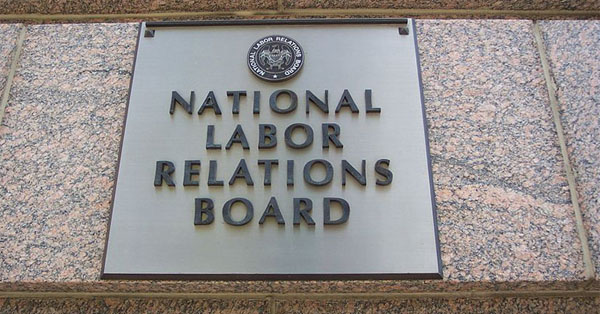
► From The Nation — Biden is rebuilding the National Labor Relations Board — A new report shows why the president had no choice but to fire the Trump-appointed general counsel of the NLRB. The nonpartisan U.S. Government Accountability Office (GAO) found that Peter Robb was dismantling the agency from the inside. He reduced staff size, destroyed employee morale, and failed to spend the money appropriated by Congress. This all occurred while Robb was pursuing an anti-worker, pro-corporate agenda.
► From Politico — Corporate America tears down Biden’s infrastructure plan — Corporate America has loudly complained for years about the crumbling state of the U.S. infrastructure and demanded that Washington invest heavily to catch up to the rest of the developed world. But now that President Joe Biden has proposed a massive $2 trillion-plus spending package, the collective response from big business is basically: “No thanks, try again.” Groups like the Chamber of Commerce and the Business Roundtable have largely rejected the plan, saying the tax hikes that Biden is proposing to pay for it would crush American competitiveness.
EDITOR’S NOTE — “We support it, but only if working people pay for it. Not us.” Also this week, dozens of corporations paid ZERO taxes last year (again).
 ► From HuffPost — Mitch McConnell to Corporate America: Shut up and donate — Senate Minority Leader Mitch McConnell (R-Ky.) warned corporate CEOs Tuesday that they should stop speaking out on political issues that he doesn’t support, but they should keep making campaign contributions to politicians like him. “My warning to corporate America is to stay out of politics,” McConnell said at a press conference, adding, “I’m not talking about political contributions.”
► From HuffPost — Mitch McConnell to Corporate America: Shut up and donate — Senate Minority Leader Mitch McConnell (R-Ky.) warned corporate CEOs Tuesday that they should stop speaking out on political issues that he doesn’t support, but they should keep making campaign contributions to politicians like him. “My warning to corporate America is to stay out of politics,” McConnell said at a press conference, adding, “I’m not talking about political contributions.”
► From The Hill — Schumer gets his game changer — A decision by the Senate parliamentarian to allow Democrats to advance multiple reconciliation packages this year is a game-changer that gives Senate Majority Leader Charles Schumer (D-N.Y.) multiple paths to advance President Biden’s agenda. At a minimum, Schumer will be able to use budget reconciliation rules to bypass Republican filibusters two more times this year.
► From Roll Call — Democrats weigh reconciliation bill for immigration action —The process being eyed to advance the infrastructure package may also help make progress on stagnant immigration policy.
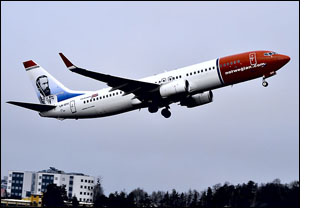 ► From Roll Call — DeFazio’s fight against Norwegian airline takes flight again — The chairman of the House Transportation and Infrastructure Committee finds himself fighting a battle once again to keep a Norwegian-based airline out of U.S. skies. Rep. Peter A. DeFazio (D-Ore.) spent years fighting to keep Norwegian Air International, a low-cost, long-haul carrier that was a subsidiary of the Oslo-based Norwegian Air Shuttle, out of the U.S. market because of his concerns over its business model, but the airline nonetheless received a permit to fly in the United States in 2016. Those flights halted last year, when the airline’s long-haul division, hard hit by the COVID-19 pandemic, declared bankruptcy. Now a new airline with connections to Norwegian Airlines, Norse Atlantic Airways, is trying to enter the U.S. market, meaning DeFazio finds himself trying again to block the permit.
► From Roll Call — DeFazio’s fight against Norwegian airline takes flight again — The chairman of the House Transportation and Infrastructure Committee finds himself fighting a battle once again to keep a Norwegian-based airline out of U.S. skies. Rep. Peter A. DeFazio (D-Ore.) spent years fighting to keep Norwegian Air International, a low-cost, long-haul carrier that was a subsidiary of the Oslo-based Norwegian Air Shuttle, out of the U.S. market because of his concerns over its business model, but the airline nonetheless received a permit to fly in the United States in 2016. Those flights halted last year, when the airline’s long-haul division, hard hit by the COVID-19 pandemic, declared bankruptcy. Now a new airline with connections to Norwegian Airlines, Norse Atlantic Airways, is trying to enter the U.S. market, meaning DeFazio finds himself trying again to block the permit.
The Stand (Dec. 5, 2016) — Norwegian Air permit decision ‘slap in the face’ to U.S. workers
► From The Hill — Over 500,000 sign up for ObamaCare in special sign-up period
NATIONAL
► From CNBC — Why the Amazon union vote is taking so long and what could come next — Voting wrapped up on March 29 in the election to determine whether roughly 5,800 workers at the BHM1 warehouse will join the Retail, Wholesale and Department Store Union. Vote counting began the next day and the public portion of the count is expected to begin as soon as Wednesday.
► From the Washington Post — The union drive at Amazon signals a potential sea change for the labor movement. Will it last? — In the 1930s and 40s, a big upswing in union organizing in the United States was marked by successful campaigns at high-profile companies like General Motors, Ford, US Steel and AT&T. Now, organizers are hoping that the union fight at Amazon could serve as a similar bellwether, particularly if it is successful — capitalizing on the most pro-labor climate in Washington in decades to inspire a wave of organizing around the country.
EDITOR’S NOTE — NOW is the time to form a union! Get more information about how you can join together with co-workers and negotiate for better working conditions and a fair return for your hard work. Or go ahead and contact a union organizer today!
► From Reuters — U.S. trade deficit hits record high in February — The U.S. trade deficit surged to a record high in February as the nation’s economic activity rebounded more quickly than that of its global rivals and could remain elevated this year, with massive fiscal stimulus expected to spur the fastest growth in nearly four decades.
TODAY’S MUST-READ
► From Vox — Life on the minimum wage — America purports to be a country of workers — a place where if you try hard enough, put in the time and effort, you’ll make it to the middle class, or at the very least be able to build a solid life of your own. But that version of America doesn’t line up with the American reality: As of 2019, 39 million people made less than $15 an hour. The federal minimum wage has been stuck at $7.25 since 2009, and 1.6 million workers make that amount or less. Many low-wage workers rely on public assistance to get by. Pew Research Center defines “middle-income” households in the US as starting at about $48,000; a $15 minimum wage at 40 hours a week adds up to $30,000; at $7.25, it’s $15,000. In recent weeks, we spoke with more than a dozen workers across the country making under $15 about how their wages shape their lives. “I don’t expect to be rich, I just expect to pay the heat bill,” said one.
The Stand posts links to Washington state and national news of interest every weekday morning by 10 a.m.

